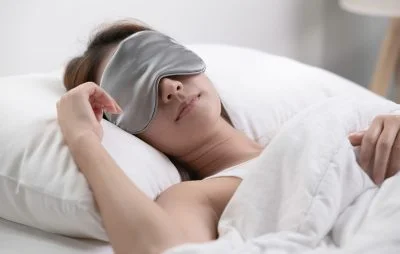
You’ve been in bed for ages, tossing, turning, and most definitely not sleeping. The longer you lay there, the more wound up you get. Sound familiar? While you may think the best idea is to just stay put — you have to fall asleep eventually, right? — fighting for sleep means ignoring your body’s natural cues. And that can interfere with your circadian rhythm, making sleep even more elusive. Instead, experts advise going to bed only when you’re tired. It sounds simple, but it’s a tried-and-true sleep hack that really works. Here’s why.
How Can You Avoid Fighting To Fall Asleep?
If you find yourself struggling to fall asleep on a regular basis, you might have already tried plenty of sleep hacks. From the viral navy seal nap to drinking lettuce water, there’s plenty of tips out there — but not all of them are expert endorsed or even all that effective. Luckily, this sleep hack actually works and follows your body’s own cues to boot.
First things first — listen to your body. If you’re tired and feeling ready for bed, that’s a good cue to start winding things down for the night. But if you get into bed and find that you’re just lying awake in the dark, don’t make yourself stay there. “I recommend getting out of bed if you cannot fall asleep within 30 minutes,” says Dr. Carleara Weiss, PhD, MS, RN, and sleep scientist. Don’t obsessively check the clock every few minutes — Weiss says doing so will only increase your anxiety and make it harder to fall asleep. “Instead, please think of how long it feels. Do you feel you have been tossing and turning, unable to fall asleep? Then get out of bed and try some relaxation techniques to help you unwind and fall asleep.”
Here are a few go-to options to try:
- Read a book. Some research shows that reading a book in bed for up to thirty minutes can help improve sleep quality. That’s likely because this sort of cognitive activity puts us in a quiet state of relaxation — just what you want to promote a good night’s sleep.
- Breathing exercises. Focusing on taking slow, even breaths is a mindfulness technique that can calm the mind and the body by relaxing the nervous system. That can help you prepare for sleep.
- Prayer. Regardless of your preferred religion, spending a few minutes in prayer at the end of the day can help you more deeply relax and let go of anxieties and tension, which might make it easier to doze off.
- Calming yoga poses. Research finds that consistent yoga practice can dramatically improve sleep, including the amount of time it takes to fall asleep, decreased disturbances while you sleep, and better overall sleep quality. If you’re doing a few gentle poses in a bid to make yourself feel sleepy, focus on calming breathwork. That will help you more fully relax into the poses to relieve tension and stress.
- Meditation. Focusing the mind with meditation techniques has been shown to help quiet the mind by reducing cortisol, a hormone associated with stress, and promote better sleep.
- A warm shower or bath. Don’t underestimate the relaxing benefits of warm water. Some research suggests it really does improve sleep.
Make a point of not reaching for your phone, and the same goes for switching on the television or any other electronic devices. “The blue light will impact the natural production of melatonin and make it harder to fall asleep,” says Weiss.
Instead, keep the lights low and engage in one of these soothing relaxation techniques until you find yourself feeling sleepy enough to go back to bed.
Creating A Calming Sleep Routine and Environment
What you do before bedtime could also help you avoid fighting for sleep. Start by getting into the right headspace with a calming bedtime routine, and take steps to practice proper sleep hygiene as well — research shows it’s one of the most significant variables affecting sleep quality.
Bedtime routines don’t need to be complicated, but aim for consistency. Some easy bedtime yoga, meditation or breathwork, or a warm bath can all help signal the body that it’s time for sleep. And the same rule applies to devices before bed — steer clear. Avoid blue light at least two to three hours before you plan to go to bed to avoid interfering with the body’s release of melatonin, the sleep hormone.
Make sure your bedroom is dark, quiet, and cool. The ideal temperature for sleep is roughly 65 degrees. Explore different pillows, blankets, sheets, and even pillow toppers to ensure your bed is comfortable and cozy. Avoid naps, alcohol, and caffeine in the late afternoon, which can all delay sleep and may block melatonin production.
How Do I Turn My Brain Off At Night?
Even if you have the perfect sleep environment, it can feel next to impossible to fall asleep if your brain is racing from one thought to the next. Not only does all that mental stimulation keep you awake, you may start feeling anxious about all the sleep you aren’t getting and how tired you’re going to feel the next day. So what can anxious sleepers do to power down their brains for the night? While Weiss says there’s no one-size-fits-all answer, there are some techniques that may help.
She recommends creating a to-do list for the next day so you don’t have to lie in bed worrying that you’ve forgotten something. Setting aside time to go through your schedule and plan your day can also help you feel more in control, as can laying out clothes and packing a lunch.
“Journaling or keeping a ‘worry book’ is also helpful,” says Weiss. “Some people like to journal before bed, while others keep a notepad on the nightstand to make notes if something bothers them at night.” If anxiety before sleep is a common pattern, you might also explore cognitive behavioral therapy. “It will address behaviors that affect the brain and make it more difficult to fall asleep,” Weiss explains.
The Last Word From Sleepopolis
The clock may show bedtime, but listening to your body is the best way to ensure a good night’s sleep. Instead of fighting to fall asleep, set yourself up for success with a consistent bedtime routine and a calming sleep environment. If you find yourself lying in bed wide awake, don’t force yourself to stay there. Instead, get out of bed and try quiet relaxation techniques to signal the body that it’s time for sleep.


























